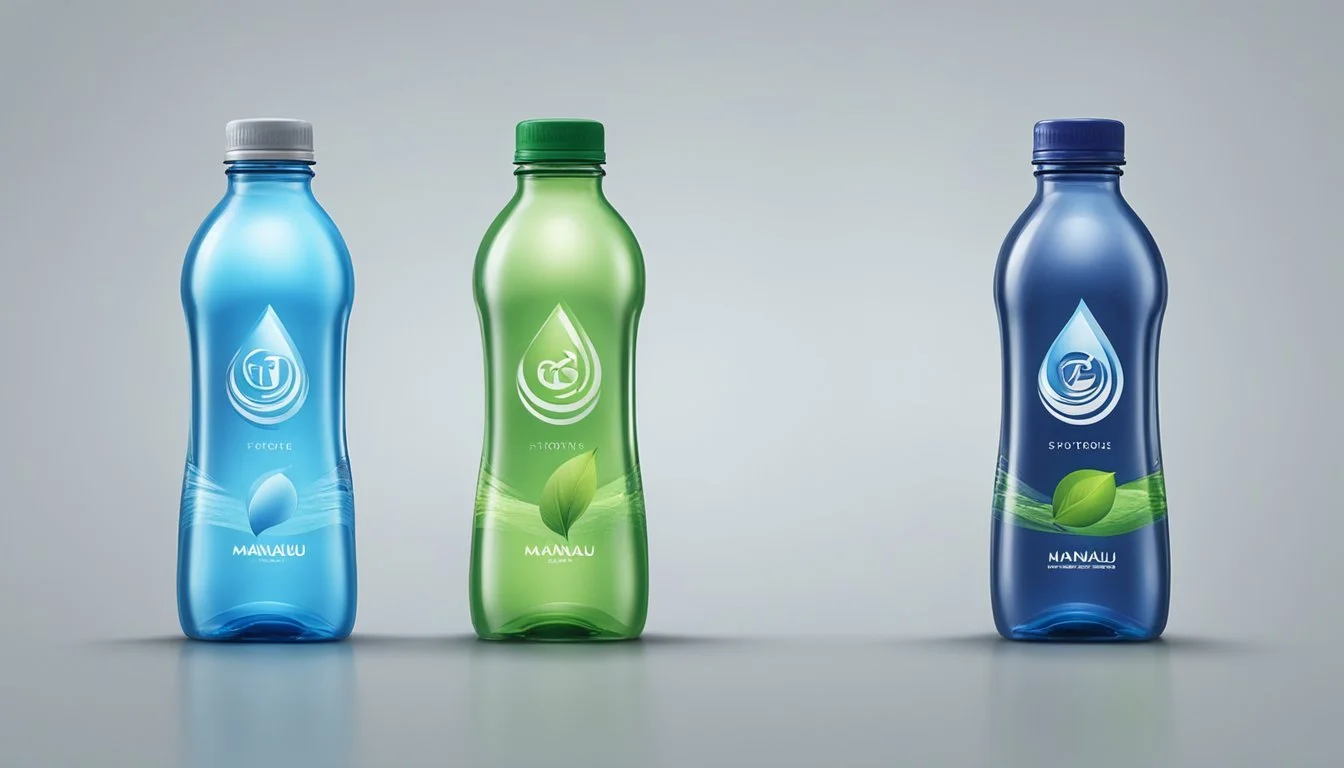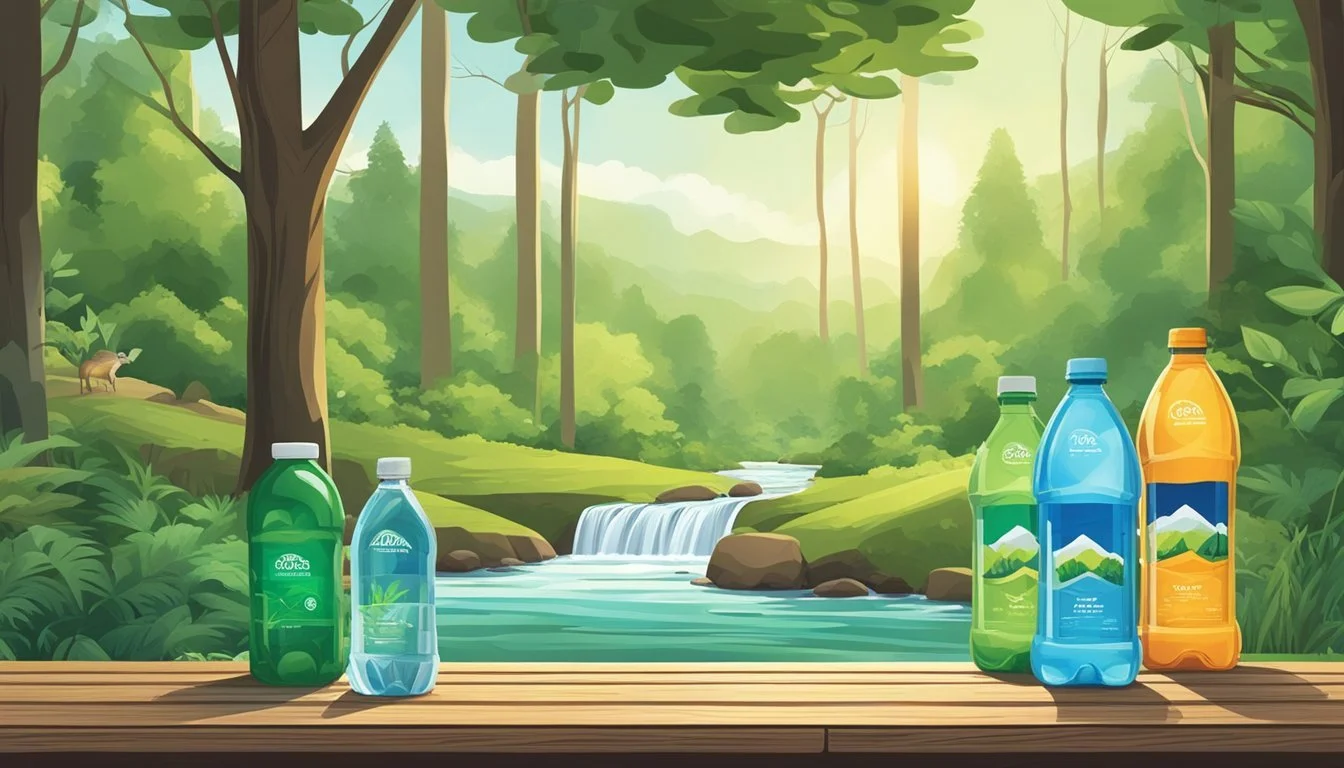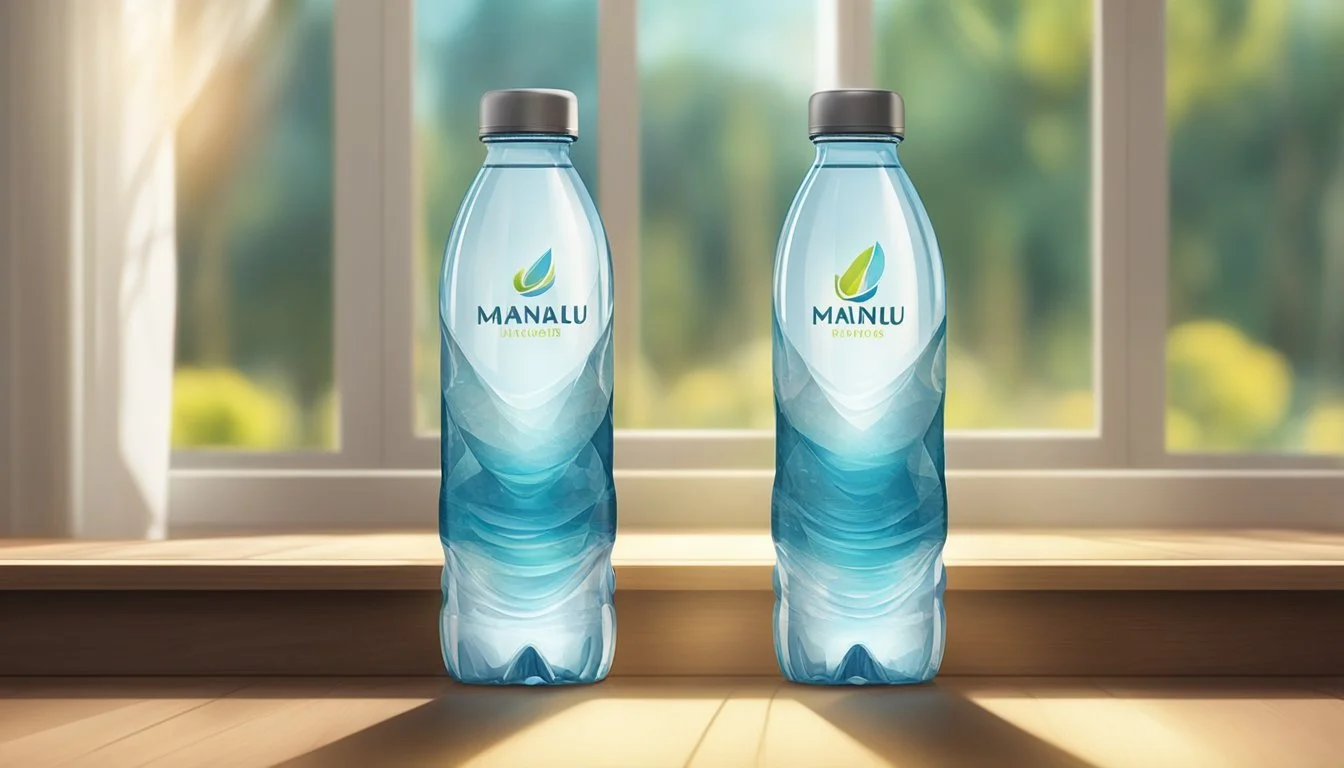Ethos vs. Mananalu
Unveiling the Best Bottled Water Choice
When it comes to choosing between Ethos and Mananalu bottled water, Mananalu's commitment to sustainability stands out as its most significant advantage. Founded by actor Jason Momoa, Mananalu offers purified water in 100 percent recyclable aluminum cans, aiming to eliminate single-use plastic bottles. This mission appeals to environmentally conscious consumers looking to reduce their carbon footprint.
Ethos, on the other hand, positions itself as a brand supporting global water projects, with a portion of its proceeds funding clean water initiatives worldwide. This charitable angle makes Ethos an appealing option for those who want their purchases to contribute directly to humanitarian efforts.
While both brands cater to different aspects of social responsibility, Mananalu's innovative packaging provides an immediate and tangible solution to plastic pollution, giving it an edge for eco-savvy buyers. So, which bottled water is better? It depends on whether you prioritize environmental sustainability or global humanitarian aid.
Understanding Bottled Water
Bottled water comes in various forms and serves different purposes, from offering convenience to addressing taste preferences. Key points include its historical growth and the types of bottled water available.
The Rise of Bottled Water
Bottled water has seen significant growth in recent decades. Once considered a luxury, it has become a staple in many households.
Factors like convenience, perceived purity, and the variety of options available have driven this rise. Companies have responded by providing water that is often marketed as purer and safer than tap water. The increase in health awareness and the focus on proper hydration have further fueled its popularity.
Specialty waters, such as spring water, purified water, and alkaline water, target specific consumer needs. The bottled water market’s expansion is also due to enhanced packaging technologies, making it easier to carry and consume water on the go. Efforts towards sustainability have led to recyclable bottles, reflecting a growing environmental consciousness among consumers.
Types of Bottled Water
Bottled water can be categorized into various types, each offering unique benefits. Still water is the most common, available in purified, spring, or mineral forms. Purified water undergoes rigorous filtration processes to remove impurities, ensuring a high level of purity.
Spring water is sourced from natural springs, and often preferred for its natural taste and mineral content. Sparkling water, carbonated either naturally or artificially, offers a fizzy alternative to still water.
Alkaline water, with higher pH levels, is marketed for its supposed health benefits, including improved hydration and pH balance. These diverse options allow consumers to choose water types based on their specific taste preferences and perceived health benefits.
Analyzing Eth
Product Characteristics
Ethos and Mananalu bottled waters stand out due to their sources, packaging innovations, and hydration benefits. Each brand brings a unique approach to purity and sustainability.
Sourcing and Purity
Ethos water is sourced from groundwater sources that are verified to be pure. Its emphasis is on quality and ensuring that the water maintains high standards of purity.
Mananalu water sources its water from locations ensuring pristine purity. Jason Momoa, the founder, chose sources that reflect the mana (sacred spirit of life) inherent in Hawaiian culture, aiming for a pure and clean hydration experience.
Packaging Innovations
Ethos utilizes recyclable plastic bottles, contributing to a reduction in waste by enabling consumers to recycle after use. Their focus on sustainability is notable but relies heavily on the assumption that consumers will follow through.
Mananalu introduces an innovative solution with recycled aluminum bottles. These are infinitely recyclable and significantly reduce single-use plastic waste. The aluminum material is durable and encourages reuse, staying true to the brand's mission of fighting plastic pollution.
Hydration and Health Benefits
Ethos water contains natural electrolytes from its groundwater sources, which aid in maintaining hydration and balance in the body’s pH levels. Its taste and composition are tailored for those seeking a reliable hydration solution.
Mananalu water also provides added electrolytes to enhance hydration, promoting both functionality and a clean, crisp taste. This focus aligns with Mananalu’s dedication to more than just hydration but also contributing to users’ overall health and well-being.
By leveraging these elements, Ethos and Mananalu present compelling hydration options with distinct benefits and innovative approaches.
Environmental Considerations
The choice of bottled water significantly impacts the environment, considering the issues of plastic pollution and the use of sustainable alternatives like aluminum.
The Issue of Plastic Pollution
Single-use plastic water bottles pose a severe environmental threat. They often end up in oceans and landfills, contributing significantly to pollution.
Plastic bottles are infrequently recycled, with many never reaching recycling facilities. This inefficiency exacerbates the carbon footprint and environmental damage.
Plastic pollution also affects marine life and ecosystems. Animals can ingest plastic particles, leading to fatal consequences. The presence of plastic in oceans impacts both the natural habitat and the species living within it.
Aluminum as a Sustainable Option
Aluminum bottles offer an environmentally friendlier alternative to plastic. They are infinitely recyclable, meaning they can be recycled repeatedly without degrading their quality.
Recycled aluminum reduces the need for raw material extraction, decreasing the environmental impact and conserving natural resources. This aspect substantially lowers the carbon footprint compared to producing new aluminum.
Brands like Mananalu emphasize their use of 100% recyclable aluminum containers. These efforts help diminish plastic waste and support a sustainable approach to packaging. By choosing aluminum, consumers can play a crucial role in preserving the environment and reducing pollution.
Comparative Analysis
Comparing Ethos and Mananalu bottled waters involves examining their quality, packaging, sustainability, market presence, and cost. Both brands emphasize sustainability but have different approaches and market strategies.
Quality and Taste
Ethos water claims a clean, crisp taste, comparable to premium options like Evian and Fiji. It is sourced and filtered to ensure high quality. Mananalu also offers purified water, marketed as “premium” and intended to compete with brands such as Voss and Essentia. Taste tests among users generally rate both Ethos and Mananalu favorably, though individual preferences may vary.
Packaging and Material Use
Ethos bottles are made from recyclable plastic and emphasize the importance of recycling in their design.
Mananalu uses 100% recyclable aluminum cans, positioning itself as an eco-friendlier alternative to standard plastic bottles. This packaging is both durable and refillable, similar to efforts by Brita and Boxed Water in their commitment to reducing plastic waste.
Sustainability and Company Mission
Ethos focuses on funding clean water initiatives globally. A portion of profits supports water projects in developing countries, aligning with their charitable approach.
Mananalu, founded by Jason Momoa, aims to eliminate single-use plastics entirely. Their mission is deeply connected to ocean conservation, with a strong emphasis on replacing plastic bottles with aluminum ones. This mission resonates with environmentally conscious consumers who prioritize sustainable packaging.
Availability and Market Presence
Ethos is widely available in Starbucks locations and numerous retail stores, benefiting from an extensive distribution network partnered with Nestlé Waters.
Mananalu, while newer on the scene, is gaining traction through partnerships with companies like Hawaiian Airlines. Its availability is rapidly expanding, though it is not yet as ubiquitous as Ethos.
Cost Considerations
Ethos is priced competitively within the premium bottled water market, similar to brands like Smartwater and Tap Water.
Mananalu tends to be slightly higher in price due to its premium packaging and environmentally focused branding. However, the cost is often justified by consumers who prioritize sustainability. Brands like Icelandic Glacial and Arrowhead provide similar price points, emphasizing premium but eco-friendly options.
In summary, both Ethos and Mananalu offer distinct advantages, from taste and packaging to sustainability efforts and market presence. Each provides a unique proposition, catering to specific consumer values and preferences regarding bottled water consumption.
Consumer Impact
Consumers considering bottled water options such as Ethos and Mananalu look at factors beyond immediate thirst-quenching. Important aspects to consider include health and safety concerns, the convenience of the product, and overall consumer choices and responsibilities.
Health and Safety Concerns
Safety is a primary concern for consumers choosing bottled water. Both Ethos and Mananalu pay attention to contaminant filtration processes to ensure their water is free from impurities and safe for drinking.
Mananalu emphasizes using naturally sourced water and packaging it in aluminum bottles, which are considered safer and more sustainable than plastic bottles. Ethos, meanwhile, also focuses on purity and safety but highlights its contributions to clean water initiatives.
Filtration processes used by both companies comply with industry standards, reducing risks of contaminants such as bacteria and heavy metals.
The Convenience Factor
Convenience is a significant factor when consumers choose bottled water. Mananalu's use of aluminum bottles scores high in this regard: they are resealable, making them more suitable for on-the-go lifestyles. They are also infinitely recyclable, adding an extra layer of convenience for environmentally-conscious users.
Ethos water, often found in premium stores and on Amazon, ensures availability but uses plastic bottles. Although refillable options are not a focus, the brand maintains a presence in popular retail channels, offering easy access for consumers.
Both brands aim to provide convenient solutions, but the refillable and easily recyclable nature of Mananalu's aluminum bottles may give it an edge.
Consumer Choices and Responsibilities
When choosing between Ethos and Mananalu, consumers must consider their environmental impact. Single-use plastics are a growing concern, and Mananalu's aluminum bottles present a more sustainable option. Recycling is crucial, and products that are easily recyclable, like those from Mananalu, support sustainable consumer behavior.
Ethos water promotes its charitable contributions to clean water initiatives, encouraging buyers to be socially responsible. Consumers choosing Ethos may feel they are supporting a greater cause beyond their purchase.
Both brands prompt consumers to weigh their consumption habits and environmental responsibilities, making informed choices based on sustainability and ethical considerations.
Corporate Responsibility and Initiatives
Ethos and Mananalu are prominent bottled water brands committed to significant environmental and social responsibilities. Their initiatives focus on sustainability, reducing carbon footprints, and creating impactful partnerships.
Strategies for Reducing Carbon Footprint
Ethos emphasizes its commitment to sustainability by utilizing recycled corrugated boxes for packaging. This approach not only minimizes waste but also supports a circular economy. In addition, Ethos has invested in optimizing its supply chain to reduce transportation-related emissions.
Mananalu employs several strategies to mitigate its carbon footprint. The brand uses BPA-free aluminum bottles, which are highly recyclable. Over 75% of aluminum produced is still in use today, significantly reducing waste. Their water is triple-filtered and responsibly sourced in the United States, ensuring minimal environmental impact during production and logistics.
Collaborations and Partnerships
Ethos collaborates with numerous environmental organizations to drive positive change. These partnerships are focused on clean water initiatives and improving community access to safe drinking water globally. Such alliances enhance Ethos’s credibility and impact in the sustainability sector.
Mananalu has formed strategic collaborations to boost its environmental efforts. One notable partnership is with rePurpose Global, through the "Drink One, Remove One" initiative. For every bottle sold, the equivalent of one plastic bottle is removed from ocean-bound waste. In collaboration with Hawaiian Airlines, Mananalu now replaces plastic bottles with its aluminum alternatives in premium cabins, further promoting sustainable practices within the airline industry.
Conclusion
When comparing Ethos and Mananalu, both have strong commitments to sustainability. Mananalu, founded by Jason Momoa, emphasizes the use of 100% recyclable aluminum cans, helping to reduce single-use plastic waste. This aligns with growing consumer concern over climate change and plastic pollution.
Ethos also prioritizes sustainability, using recyclable bottles and supporting clean water initiatives. Their charitable contributions add value for consumers who prioritize social impact as part of their purchasing decisions.
Aspect Mananalu Ethos Material 100% Recyclable Aluminum Recyclable Plastic Sustainability Focus on eliminating plastics Contributions to water causes Founder Jason Momoa Not celebrity-associated
Both brands offer viable alternatives to traditional bottled water. Mananalu stands out with its packaging innovation, while Ethos appeals through its social responsibility efforts. Consumer choice between the two will likely depend on individual priorities of sustainability and social impact.
In regard to taste and quality, personal preference will play a significant role as both brands maintain a high standard of purified water.
More About Ethos
Ethos vs Mountain Valley Spring Water: Which Bottled Water is Better?
Ethos vs Richard's Rainwater: Which Bottled Water is Better?
Ethos vs Whole Foods Italian Still Mineral water: Which Bottled Water is Better?
More About Mananalu
Hawaiian Springs vs Mananalu: Which Bottled Water is Better?
Icelandic Glacial vs Mananalu: Which Bottled Water is Better?
Mananalu vs Cascade Mountain: Which Bottled Water is Better?
Mananalu vs Kirkland Signature: Which Bottled Water is Better?
Mananalu vs Richard's Rainwater: Which Bottled Water is Better?
Mananalu vs Talking Rain AQA: Which Bottled Water is Better?
Mananalu vs Whole Foods Italian Still Mineral water: Which Bottled Water is Better?
Mountain Valley Spring Water vs Mananalu: Which Bottled Water is Better?
Nestle Pure Life vs Mananalu: Which Bottled Water is Better?






